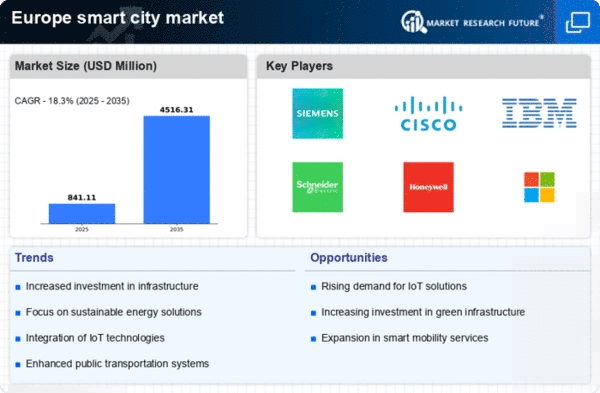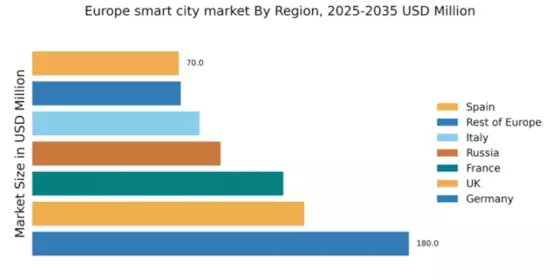Rising Urbanization
The rapid pace of urbanization in Europe is a significant driver of the smart city market. As urban populations continue to swell, cities face mounting challenges related to infrastructure, transportation, and resource management. By 2030, it is projected that over 80% of the European population will reside in urban areas, necessitating innovative solutions to enhance livability and sustainability. This trend compels city planners and policymakers to invest in smart technologies that can optimize urban services, such as waste management and energy consumption. The smart city market is thus likely to expand as cities seek to implement integrated solutions that address the complexities of urban living, ultimately improving the quality of life for residents.
Technological Advancements
Technological advancements are fundamentally transforming the landscape of the smart city market in Europe. Innovations in artificial intelligence, big data analytics, and the Internet of Things (IoT) are enabling cities to develop more efficient and responsive urban systems. For example, the integration of AI in traffic management systems can lead to a reduction in congestion by up to 30%, thereby enhancing mobility. Moreover, the proliferation of smart sensors allows for real-time data collection, which is crucial for informed decision-making. As these technologies continue to evolve, they are expected to drive further investment in the smart city market, with estimates suggesting a growth rate of around 25% annually over the next five years.
Public Safety and Security Needs
Public safety and security needs are becoming increasingly critical in the context of urban environments, thereby driving the smart city market in Europe. With rising concerns over crime and emergency response times, cities are investing in smart surveillance systems and emergency management solutions. For example, the implementation of smart CCTV systems can enhance monitoring capabilities, potentially reducing crime rates by up to 15%. Furthermore, integrated communication systems enable faster response times during emergencies, which is vital for public safety. As urban areas continue to evolve, the demand for advanced security technologies is expected to grow, thereby propelling the smart city market forward.
Government Initiatives and Funding
Government initiatives play a pivotal role in shaping the smart city market in Europe. Various national and local governments are increasingly allocating substantial budgets to support smart city projects. For instance, the European Union has earmarked approximately €100 billion for digital transformation initiatives, which includes smart city developments. This funding is aimed at enhancing urban infrastructure, improving public services, and fostering innovation. As a result, cities are more likely to adopt advanced technologies, such as smart grids and intelligent transportation systems, which are essential components of the smart city market. Furthermore, these initiatives often encourage public-private partnerships, facilitating collaboration between government entities and private sector players, thereby accelerating the growth of the smart city market in Europe.
Environmental Concerns and Climate Change
Environmental concerns and the pressing issue of climate change are increasingly influencing the smart city market in Europe. Cities are under pressure to reduce their carbon footprints and enhance sustainability. This has led to the adoption of smart solutions, such as renewable energy sources and energy-efficient buildings. For instance, cities that implement smart grids can potentially reduce energy consumption by 20-30%, contributing to climate goals. Additionally, the European Green Deal aims to make Europe the first climate-neutral continent by 2050, which further propels investments in smart city technologies. As cities strive to meet these ambitious targets, the smart city market is likely to witness substantial growth driven by eco-friendly innovations.
















